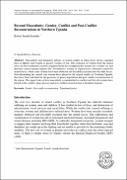| dc.contributor.author | Esuruku, Robert Senath | |
| dc.date.accessioned | 2018-12-21T12:53:22Z | |
| dc.date.available | 2018-12-21T12:53:22Z | |
| dc.date.issued | 2011 | |
| dc.identifier.issn | 2070-1748 · Vol.4 · Nov. 2011 · 25-40 | |
| dc.identifier.issn | DOI: http://dx.doi.org/10.4314/jssd.v4i1.3 | |
| dc.identifier.uri | http://hdl.handle.net/20.500.12280/1307 | |
| dc.description.abstract | Masculinity and femininity debates of armed conflict in Africa have always regarded
men as fighters and women as passive victims of war. The exclusion of women from the armed
forces in most traditional societies originated from the assumption that women are a weaker sex and
therefore cannot manage military life. Nevertheless, women in Uganda have voluntarily joined the
armed forces, while some of them have been abducted and forcefully recruited into the rebel forces.
Notwithstanding the central role women have played in the armed conflict in Northern Uganda,
they have been side-lined in the processes of peace negotiation and post conflict reconstruction of
the region. This paper looks at how masculinity is manipulated in conflict and the role women have
played in the conflict, peace process and post conflict reconstruction in Northern Uganda. | en_US |
| dc.language.iso | en | en_US |
| dc.publisher | African Journals Online | en_US |
| dc.rights | Attribution-NonCommercial-NoDerivs 3.0 United States | * |
| dc.rights.uri | http://creativecommons.org/licenses/by-nc-nd/3.0/us/ | * |
| dc.subject | Gender | en_US |
| dc.subject | Post-conflict reconstruction | en_US |
| dc.subject | Transitional justice | en_US |
| dc.title | Beyond Masculinity: Gender, Conflict and Post-Conflict Reconstruction in Northern Uganda | en_US |
| dc.type | Article | en_US |



